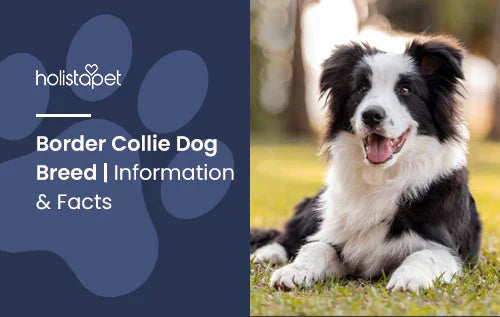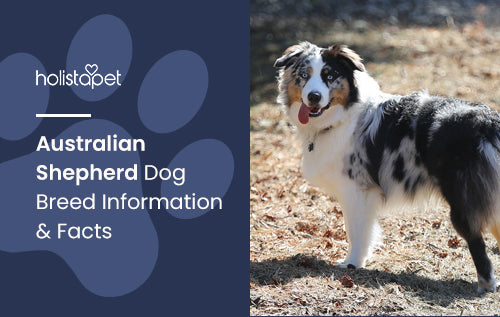What has four paws, a high energy level, and a strong work ethic? You guessed it, the Border Collie! A popular pet nowadays, this beautiful canine was originally bred in Scotland as a working dog. This medium-sized herding canine is one of the smartest dog breeds there is! Those that aren't pets are often used for search and rescue, one UK Border Collie saving the life of a woman who'd been missing for two nights.
Border Collies are still using their shepherding skills to this day! A Florida company even trains these dogs to chase geese away from people's lawns. Have questions about the Border Collie? Great! This guide will help you learn more about the energetic working dog, their needs, and their history.
Border Collie Characteristics
The Border Collie is a double-coated dog breed sporting an athletic build. That agile physique isn't just for show; throughout its life span, this sheepdog will require daily exercise to satisfy its immense storage of energy. Their keen, alert expression suits their responsive and intelligent nature. This dog breed enjoys a long life (generally 12-15 years), even if not as long as the mighty Chihuahua (which has an average life expectancy of 15-20 years).
You might occasionally spot a Border Collie crouched, head down, giving you — or perhaps a child — an intense stare. These dogs are famous for their "herding eye," which they use to intimidate flocks of sheep. This dog breed even has a tendency to herd children if not trained otherwise!
Border Collie Size
The Border Collie is an agile, medium-sized breed. Males will often grow to between 19 and 22 inches. For females, their final height usually lands between 18 and 21 inches. An average adult Border Collie will weigh between 30 and 55 pounds.
Border Collie Personality
The personality of a Border Collie is defined by its intelligence. This brainpower influences the other aspects of the animal's character, making them tenacious, energetic, and keen. Border Collies are eager to please and highly responsive to commands. In competitions, you may spot them looking up at their owner expectantly, waiting for the next task.
The herding dog breed might be the smartest canine out there. Stanley Coren, a canine neuropsychology professor at the University of British Columbia, named the Border Collie the smartest of all pooches in his book The Intelligence of Dogs. Using command retention as a marker of intellect, Coren evaluated 110 animals, each a different dog breed, in conjunction with the assessments of over 200 professional dog obedience judges. The Border Collie was able to obey (with a 95% success rate) new orders that were repeated fewer than five times.

Border Collie Exercise
Exercise is one of the most important aspects of caring for a Border Collie. The herding dog breed has had over a hundred years of genetic reinforcement to provide them with intelligence, agility, and a high energy level to perform a job (wrangling sheep) that they generally no longer have to do. This is why Border Collies are not recommended for pet owners who may be unable to provide their dogs with high amounts of exercise.
Border Collies are not the first hounds to be bred for work. Saint Bernards were originally used as rescue dogs in mountain regions, and Akitas served as hunters in Japan. Dog breeds that originate from performing these types of jobs retain the energy reserves needed to carry them out. Even when there's no work to be done!
Exercising For at Least 2 Hours a Day
Just how much exercise will you have to give a Border Collie? The short answer is way more than the average breed. Generally, you should give your Border Collie a minimum of two hours of exercise per day. Any additional physical stimulation you can provide these dogs with will be even better!
Don't worry about tiring out your average Border Collie. Why? Because you'll probably have to keep up with them yourself! Herding dogs, like Border Collies, excel when given some sort of job, but the average pet owner doesn't have sheep to corral or stranded hikers to rescue. So where should this exercise come from?
Besides the usual sources of activity — walks, hikes, fetch — the Border Collie dog breed excels at canine sports. In fact, this breed is so good at athletics that some competitions in England have an "ABC" category, standing for "Anything But Collies." Some dog sports to consider training your dog for are flyball, frisbee, obstacle courses, dock jumping, tracking trials (simulating a search-and-rescue scenario), or sheepdog trials.
Sheepdog trials are one of the most popular dog sports for Border Collies and a great way to allow your pet to get exercise. The competition consists of herding sheep into a pen or along a line, with scoring based on efficiency and speed. If you live in an urban area where sheep are scarce, treibball could be an alternative. Treibball is the same event, but herding dogs will instead shepherd large, inflated balls into pens.
Border Collie Training
Border Collies can be reserved around strangers, so socialization training from puppyhood is crucial. Introduce your dog to various people and environments early in the pet's life to make them more comfortable around non-family members. Obedience training should also start before the dog fully matures, as Border Collies crave mental training in addition to physical exercise.
You may not be planning to enter your Border Collie into any competitions! But agility training can nevertheless be a great outlet for the energetic breed. If you've ever seen obstacle courses in a dog show, you're familiar with the canine sport known as agility. This sport is ideal for a herding breed, as agility provides them with a mental challenge as well as exercise. In order to properly complete a course, your Border Collie will need to use memory, strategy, and self-discipline.
In competitions, no food or toys may be used as incentives, so dogs must have the intelligence and stamina to run a course with minimal guidance. Naturally, the Border Collie dog breed is well-suited for this sport. It's no wonder that of the last six Westminster Masters Agility champions, all but one were Border Collies.

Border Collie History
The herding canine can trace its ancestry back to the border between Scotland and Britain (hence "border," with "collie" being a Scottish word for sheepdogs) in the latter half of the 19th century. It is believed that all modern Border Collies can trace their roots back to a single dog, named Old Hemp, born in 1893.
Further back, the Border Collie would not be alive today if not for the Romans, the Vikings, and Britain. When the Romans conquered Britain in the year 43 A.D., they brought livestock and herding dogs with them. Later, when the Vikings raided the lands, they too brought a dog breed whose descendants are the Icelandic Sheepdogs of today. As the Roman breed and Viking breed got to know one another, they birthed an agile, energetic dog that would become the Border Collie.
The Border Collie may have been destined to remain a herding dog breed had it not been for a particular British monarch. Reigning nearly 64 years (the longest until Elizabeth II), Queen Victoria was an avid dog lover. She supported the Royal Society for Prevention of Cruelty to Animals and inspired the formation of the Ladies' Kennel Club.
Victoria's favorite dog breed by far was the Border Collie, back when the canine was not popular among those who didn't need sheep corralled. Victoria's love of this breed popularized the dog as a pet and a show dog. Without the Queen, we might not have the Border Collie as we know it today.
Border Collie Health Issues
Dogs of every breed are susceptible to certain kinds of health issues. In Siberian Huskies, its autoimmune problems. For Bulldogs, respiratory issues are not uncommon. Regrettably, the Border Collie dog breed is no exception, prone to the following.
Hip Issues
Hip issues refers to abnormal hip joint development that can lead to joint problems and loss of joint function. The condition frequently affects large and giant dogs, but Border Collies are also commonly affected. Healthy dietary and exercise habits can reduce the risk of dogs developing hip issues.
Digestive Issues
Digestive issues can arise if your dog is not absorbing nutrients properly. Intestinal malabsorption is more common in Border Collies and Australian Shepherds than other breeds. The condition means that your pet may not be getting proper amounts of cobalamin, (vitamin B12), an essential nutrient. Border Collies can experience loss of appetite and/or proteins, inhibited growth, as well as low red and white blood cell counts. Fortunately, the condition is rare, and cobalamin injections can be administered if the dog tests positive for malabsorption.

How to Care for a Border Collie
When it comes to Border Collies, exercise is the primary concern. When contemplating buying this dog breed, whether or not you can provide adequate space and physical stimulation should greatly influence your decision. Nutrition and grooming are also very important, so let's take a look at some of these requirements.
Nutrition and Feeding for Border Collies
With all of their energy, Border Collies typically need a lot of calories when compared to a lap dog that might not move around as much. Two meals, each consisting of .75 to 1 cup of dry food, is the recommended daily amount of nutrition for the average Border Collie. As with all pets, the dietary needs of each dog are greatly affected by their size, activity level, and metabolism.
Another important variable is the quality of dog food you serve your Border Collie. Kibble that is poor in nutritional value will require larger portions to satisfy your pet's needs. Top-shelf brands can pack more vitamins and nutrients into fewer calories. Look for food that offers upwards of 20% protein and, if safe for your dog, probiotics.
Carbohydrates
Carbohydrates are a great source of replenishing energy for your Border Collie. Whole grains, legumes, and fiber-rich vegetables are all great sources of complex carbs. Though, if your dog has digestion troubles, ingredients rich in fiber may not be the best thing for them.
Border Collies have gorgeous coats, but they do shed quite a bit! To minimize this, as well as maintain the health and shine of your Border Collie's coat, look for essential fatty acids in your dog's food. These acids include omega-3s and omega-6s, commonly found in fish oil and flaxseed. High-activity in Border Collies may lead to a lot of wear on their joints. Luckily, ingredients or supplements that contain glucosamine, chondroitin, or turmeric, help to keep joints healthy!
Related: Dogs Diet: CBD for dogs treat
Coat Color And Grooming
The Border Collie is a dog breed similar to the Bernese Mountain Dog or the Golden Retriever in that it sports a double coat. A double coat is made up of a top and undercoat. The undercoat insulates the pet, while the topcoat is made up of stiff hairs that guard against dirt and water. Not all dogs have double coats (Poodles and the Maltese Dog Breed are examples of single coat canines), but there's no need to worry if you've never groomed one before because the process is the same. Matting, dirt, and shedding are still the largest concerns when it comes to brushing and cleaning.
A Border Collie might be a rough coat or a smooth coat breed. The rough coat Border Collie features medium-length, feathered hair while smooth coat dogs have short, coarse hair. Rough or smooth, either dog breed's coat is dense and protective from the elements.
Dogs like the Afghan Hound or Puli require grooming that is specific to their hair! You can care for the average Border Collie like most other canines. Comb the hair with a pin brush at least 1-2 times a week, and daily during shedding season. The nails of an average dog should be trimmed once a month, and a good dental cleaning is recommended twice a week.

Children And Other Pets
Border Collies possess a herding instinct that could potentially be unsuitable for households with small children or other pets. You can train your dog on this behavior, so keep an eye on them when your dog is a pup. Any nipping/nudging of children or other pets should be discouraged or refocused into games like treibball.
It is important to acclimate this dog breed to different people and animals when it's young! This should be done in advance so that socialization isn't an issue when a dog is an adult. Border Collies are not always the most welcoming to strangers. As such, their herding instincts can make them come across as aggressive.
These canines may often be slaves to their impulses. Though, you should keep in mind that these dogs are only reacting to movement. They don't mistake your children or the family cat as sheep, and shouldn't take their aggression farther than the occasional nip. Any predatory instincts in this dog breed generally end with the chase.
Related: Dog Aggression: How To Calm With Cannabidiol
Rescue Groups
Many rescue groups operate locally, pulling dogs that are set to be put down from shelters in their cities. The American Kennel Club (AKC) has over 450 Rescue Network groups across the United States. Click here to search their database, organized alphabetically by dog breed, and find a rescue group near you.
National rescue groups include Start Over Rover and Pet Lovers Sanctuary. Petfinder is an excellent tool for finding adoptable pets near you. The site has a great feature that allows you to search for pets offered by a particular rescue group. You can also search by breed, age, size, gender, coat length, color, and how good the animal is with children or other pets.
Breed Organizations
The Border Collie Society of America's stated primary goal is to ensure "a future where no Border Collie goes unwanted," and they strive for that goal every day with events, breeding resources, and even DNA test kits. The BCSA is a Parent Club of the AKC (a Parent Club is essentially a specialty organization that focuses on just one breed), and a great choice for your Border Collie's membership.
Another notable breed organization is the United Kennel Club (UKC). The UKC officially recognized the Border Collie dog breed in 1961. While the BCSA only vaguely mentions deviations from the breeding standard as a disqualification for membership, the UKC is more specific. The United Kennel Club considers the following to be disqualifying for membership: unilateral or bilateral cryptorchid (a testicular defect), viciousness or extreme shyness, and albinism.
Fun fact: The AKC's official standard for this dog breed allows for "honorable scars and broken teeth incurred in the line of duty." Yikes!

More About Border Collies Breed
There are some arguments between show enthusiasts, those who use dogs for herding, and those who breed dogs over whether the Border Collie should be favored for its appearance or its work. There is a fear that the promotion of aesthetic traits when breeding will cause a decline in the natural instinct that the dog is known for, and vice versa.
Border Collies bred for looks do not usually participate in herding competitions such as sheepdog trials, and those that work or excel at trials rarely conform to breed standards.
Final Thoughts - Border Collie Breed
She's beauty, she's grace, she herds sheep all over the place. With a tenacious work ethic and monumental levels of energy, the Border Collie is a breed like no other. Whether you put them to work, take them on hikes, train them as show dogs, or teach them treibball, a Border Collie is ready to jump in!
Perhaps there will come another highly athletic breed somewhere down the line to challenge the Border Collie as one of the most athletic and intelligent canines around, but clearly, there's not much competition yet!. Get more info here.


 CBD Oil for Dogs - Fast Acting
CBD Oil for Dogs - Fast Acting
 Chicken Flavored CBD Oil For Dogs - Easy Dose
Chicken Flavored CBD Oil For Dogs - Easy Dose
 Salmon Flavored CBD Oil For Dogs - Highly Rated
Salmon Flavored CBD Oil For Dogs - Highly Rated
 CBG Oil for Dogs and Cats - Loved by Thousands
CBG Oil for Dogs and Cats - Loved by Thousands





Leave a comment
All comments are moderated before being published.
This site is protected by hCaptcha and the hCaptcha Privacy Policy and Terms of Service apply.